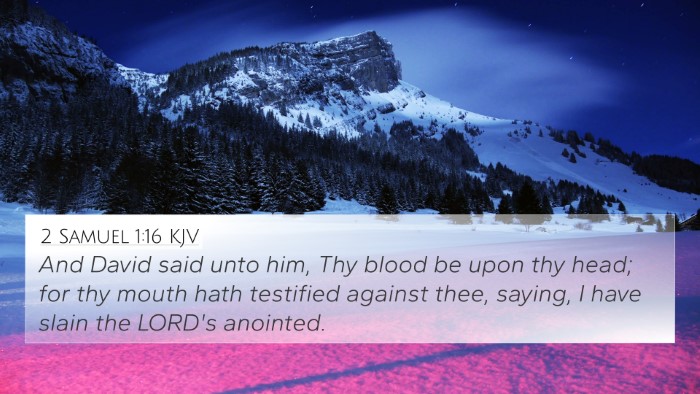Understanding 1 Samuel 26:9
The verse 1 Samuel 26:9 presents a profound moment in the narrative of David and Saul. It states:
"But David said to Abishai, 'Do not destroy him; for who can stretch out his hand against the Lord's anointed and be guiltless?'"
Summary of 1 Samuel 26:9 Meaning
This verse captures David's respect for God's anointed king, illustrating a core biblical principle of honoring God's authority, even amidst personal grievances. David, despite having the chance to eliminate Saul, chooses restraint, demonstrating his faith and moral integrity.
Key Insights from Public Domain Commentaries
-
Matthew Henry:
Henry emphasizes the importance of David's respect for God's anointed, highlighting that taking violent action against Saul would be a serious offense before God. He suggests that this illustrates how one ought to treat those whom God has appointed, regardless of personal animosity.
-
Albert Barnes:
Barnes focuses on the idea of accountability, noting that David perceives the act of harming the anointed king as an act against God's will. This serves as a lesson on obedience and the consequences of defying God’s chosen leaders.
-
Adam Clarke:
Clarke delves into the nature of anointing, elucidating how it signifies being chosen for a divine purpose. He points out that David's refusal to harm Saul onwards denotes a deep-rooted understanding of God's justice and providence.
Bible Verse Cross-References
Understanding 1 Samuel 26:9 can be enhanced through various cross-references throughout the Bible, demonstrating the thematic connections surrounding leadership, authority, and the principle of respect for God's choices. Here are several relevant verses:
- 1 Samuel 24:6: "He said to his men, 'The LORD forbid that I should do such a thing to my master, the LORD's anointed, or lay my hand on him; for he is the anointed of the LORD.'"
- Psalm 105:15: "Do not touch my anointed ones; do my prophets no harm."
- Romans 13:1: "Let everyone be subject to the governing authorities, for there is no authority except that which God has established."
- Matthew 26:52: "Put your sword back in its place, for all who draw the sword will die by the sword."
- Acts 9:5-6: "Who are you, Lord?' Saul asked. 'I am Jesus, whom you are persecuting...'"
- 1 Chronicles 16:22: "Touch not mine anointed, and do my prophets no harm."
- 1 Peter 2:17: "Show proper respect to everyone, love the family of believers, fear God, honor the emperor."
Thematic Bible Verse Connections
The teachings in 1 Samuel 26:9 resonate with several broader biblical themes, including:
- Respect for Authority: The emphasis on recognizing God's appointed leaders highlights the significance of divine authority.
- Moral Integrity: David’s decision not to harm Saul serves as an example of personal conviction and ethics in difficult situations.
- Divine Providence: Trusting in God’s plan, rather than taking matters into our own hands, reinforces the lesson of faith in God's timing.
- Consequences of Sin: The understanding that transgressions against God’s anointed can lead to serious repercussions.
Comparative Bible Verse Analysis
Analyzing 1 Samuel 26:9 in comparison to other scriptural passages can yield insights into its context:
- David and Saul's Relationship: The continuous tension depicted between David and Saul is a narrative thread that invites reflection on themes of fear, jealousy, and divine choice.
- Jesus and Authority: The teachings of Jesus on loving one’s enemies and respecting authorities align closely to David’s actions.
Tools for Bible Cross-Referencing
Utilizing tools for Bible cross-referencing enhances one's study, enabling deeper connections such as:
- Bible Concordance: An indexed tool to locate words and phrases within the text.
- Bible Cross-Reference Guide: A resource that lists related verses and themes systematically.
- Cross-reference Bible Study: A methodical approach for correlating passages to derive meaningful conclusions.
- Bible Reference Resources: Includes commentaries, dictionaries, and study guides.
Conclusion
1 Samuel 26:9 invites us to reflect on our attitude toward authority and God’s anointed. Through comparative studies and thematic analysis, one can appreciate the depth of this passage within the grand narrative of the Bible. Engaging with cross-references enriches the understanding of this scripture, illustrating the interconnectedness of the biblical text across both the Old and New Testaments.






